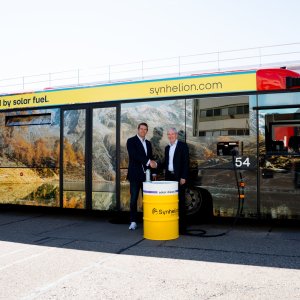Solar fuel pioneer Synhelion receives funding from the Energy Research Program of the German Federal Ministry for Economic Affairs and Energy
Bergisch Gladbach, Germany, October 14, 2021
As part of its Energy Research Program, the German Federal Ministry for Economic Affairs and Energy (BMWi) is supporting the SolarFuels research project by Synhelion and other partners with EUR 3.92 million to advance the use of synthetic fuels in Germany and across Europe. Synhelion will use the funding to build the world’s first industrial plant for solar fuels.
Transitioning from fossil to renewable energy sources is one of the most important global challenges. Synthetic fuels are climate-friendly and offer a sustainable alternative to fossil fuels. They are compatible with conventional combustion engines, aircraft turbines, and the existing fuel infrastructure. Due to their high energy density, they also meet the requirements for long-distance transportation and aviation.
The BMWi is supporting the SolarFuels research project as part of its ambition to expand the production of synthetic fuels in Germany. The project is being carried out by Synhelion Germany GmbH, the German Aerospace Center e.V. (DLR), and the Solar Institute Jülich of Aachen University of Applied Sciences.
The world’s first industrial plant for solar fuels
The aim of the project is to build and operate the world’s first plant for the industrial production of solar fuels at Brainergy Park Jülich, North Rhine-Westphalia, Germany. The plant will cover the entire process from concentrated sunlight to synthetic liquid fuel on an industrial scale for the first time. The end products will be solar kerosene and solar gasoline.
Synthetic fuels for the decarbonization of aviation and long-distance transportation
The plant will employ Synhelion’s solar thermal process for the production of solar fuels based on process heat from concentrated sunlight. In 2019, Synhelion had already demonstrated the feasibility of its technology under real operating conditions in a small pilot plant with ETH Zurich. In 2020, Synhelion successfully tested a second prototype with the artificial sunlight at the DLR’s Synlight facility. To bring solar fuels to market as quickly as possible, Synhelion partnered with Wood, a global leader in consulting and engineering across energy and the built environment, in May 2021. As part of this collaboration, a test facility for the production of syngas was set up on the DLR’s solar tower in Jülich to demonstrate the technology on an industrial scale.
Gianluca Ambrosetti, CEO and Founder of Synhelion, commented: “The funding from the BMWi is a recognition of the future viability of our solar fuel technology. It confirms our potential for commercial success and supports us on our path toward commercialization.”
Professor Christian Sattler, Acting Director of the DLR Institute for Future Fuels, added: “The tests on the Jülich solar tower and the new facility at Brainergy Park are important steps on the road to industrial production of solar fuels. We are very pleased to be able to develop these projects together with Synhelion.”
The German government’s research focus area ‘Alternative Fuels’ provides funding to technologies that will contribute to CO2-free mobility. As liquid energy carriers with a high energy density, synthetic fuels offer a promising solution for efficiently reducing CO2 emissions in aviation and long-distance transportation.
For the full English press release, see here.
For the full German press release, see here.
Download:

Synhelion uses the DLR’s solar tower in Jülich to test its solar fuel technology on industrial scale. Source: Synhelion



